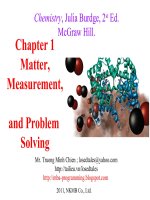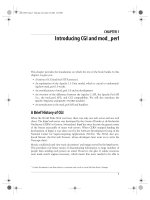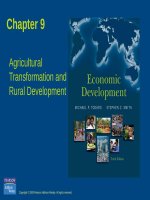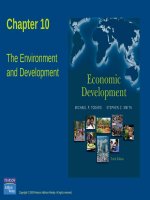Lecture Macroeconomics (19/e) - Chapter 1: Limits, alternatives, and choices
Bạn đang xem bản rút gọn của tài liệu. Xem và tải ngay bản đầy đủ của tài liệu tại đây (313.75 KB, 15 trang )
01
Limits, Alternatives, and Choices
McGrawHill/Irwin
Copyright © 2012 by The McGrawHill Companies, Inc. All rights reserved.
Introduction
LO1
•
•
Economics defined
•
A social science concerned
with making optimal choices
under conditions of scarcity
Economic wants exceed
productive capacity
1-2
The Economic Perspective
LO1
Scarcity and
Choice
Purposeful
Behavior
Marginal
Analysis
• Resources
are scarce
• Rational
• Marginal
self-interest benefit
• Choices must • Individuals
be made
and utility
• Marginal cost
• Opportunity
cost
• Firms and
profit
• Marginal
means extra
• There’s no
free lunch
• Desired
outcomes
• MB and MC
1-3
Theories, Principles, and Models
•
The scientific method
Observe
Formulate a hypothesis
Test the hypothesis
Accept, reject, or modify the hypothesis
Continue to test the hypothesis, if necessary
•
LO2
Economic principles
• Generalizations
• Other-things-equal assumption
• Graphical expression
1-4
Microeconomics and Macroeconomics
•
•
•
•
LO3
Microeconomics
Decision making by individual
units
Macroeconomics
Examines either the economy as
a whole or its basic subdivisions
or aggregates
1-5
Positive and Normative Economics
•
•
•
•
LO3
Positive economics
Deals with economic facts
Normative economics
A subjective perspective of the
economy
1-6
Individual’s Economizing Problem
•
•
•
•
•
•
•
LO4
Limited income
Unlimited wants
A budget line
Attainable and unattainable options
Trade-offs and opportunity costs
Make the best choice possible
Change in income
1-7
Individual’s Economizing Problem
DVDs Books
$20
$10
60
52
44
36
28
110
012
12
10
Quantity of DVDs
$120 Budget
Income = $120
Pdvd = $20
8
=6
Unattainable
6
Income = $120
= 12
Pb = $10
4
2
0
Attainable
2
4
6
8
10
12
Quantity of Paperback Books
LO4
14
1-8
Society’s Economizing Problem
•
•
•
•
•
LO4
Scarce resources
Land
Labor
Capital
Entrepreneurial Ability (takes
initiatives, makes decisions,
innovates, and takes risks)
1-9
Production Possibilities Model
•
•
•
•
•
•
LO5
Illustrates production choices
Assumptions
Full employment
Fixed resources
Fixed technology
Two goods
1-10
Production Possibilities Model
Production Alternatives
Type of Product
Pizzas
A
B
C
D
E
0
1
2
3
4
10
9
7
4
0
(in hundred thousands)
Industrial Robots
(in thousands)
Plot the Points to Create the Graph…
LO5
1-11
Industrial Robots
Production Possibilities Model
14
13
12
11
A
10
B
9
8
Unattainable
C
7
6
5
D
4
U
3
2 Attainable
E
1
0
1
2
3
4
5
6
7
The law of
increasing
opportunity
costs makes
the PPC
concave.
8 9
Pizzas
LO5
1-12
Industrial Robots
A Growing Economy
14
13
12
11
10
9
8
7
6
5
4
3
2
1
A’
B’
Unattainable
A
B
Economic
Growth
C’
C
D’
D
Now Attainable
Attainable
E’
E
0
1
2
3
4
5
6
7
8 9
Pizzas
LO6
1-13
Present Choices, Future Possibilities
Future
Curve
Current
Curve
P
Goods for the Present
Presentville
LO6
Goods for the Future
Goods for the Future
Compare Two Hypothetical Economies
Future
Curve
F
Current
Curve
Goods for the Present
Futureville
1-14
Pitfalls to Sound Economic Reasoning
•
•
•
•
•
Biases
Loaded terminology
Fallacy of composition
Post hoc fallacy
Correlation not causation
1-15









